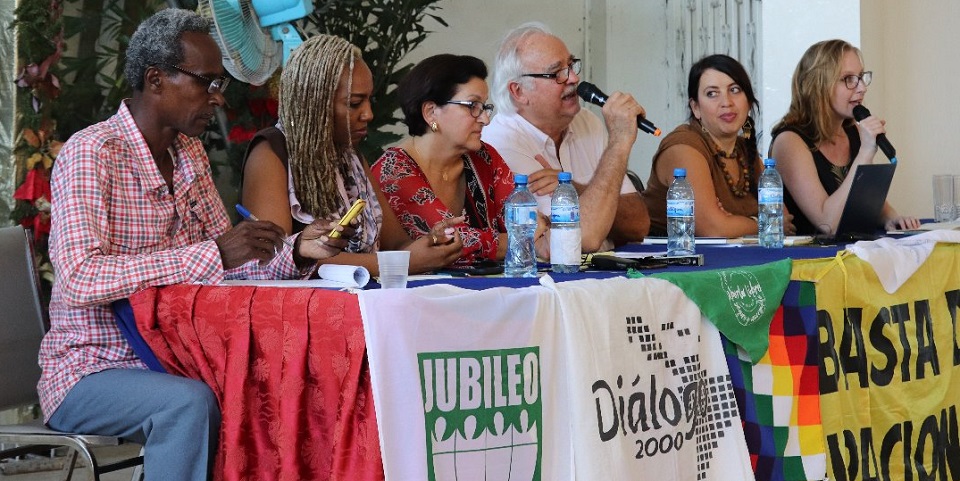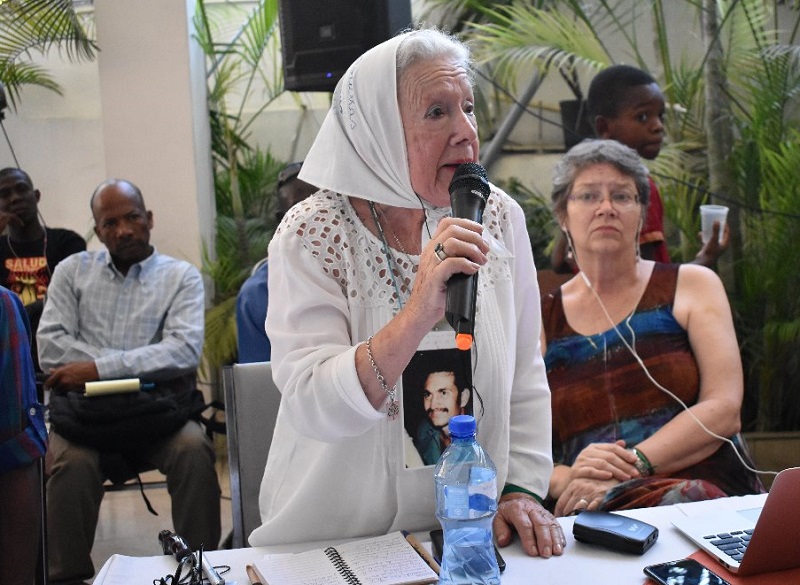Peoples’ Tribunal to judge crimes committed by UN “Stabilisation Mission” MINUSTAH in Haiti
Announcement made during the International Colloquium on Occupation, Sovereignty and Solidarity

The Peoples’ Tribunal will assess and rule on the crimes committed during the 15 years of international military occupation in Haiti through the United Nations “peacekeeping” missions (such as MINUSTAH and MINUJUSTH). The Tribunal will aim to promote “processes of disengagement, justice and reparation for all the victims of repression, sexual violence and cholera introduced by the occupation troops”, reported the organizers.
The organizers include the Haitian Platform to Advocate Alternative Development (PAPDA), the Institute for Justice and Democracy in Haiti (BAI/IJDH), the Haitian Movement of Liberty, Equality and Fraternity (MOLEGHAF), with the support of La Vía Campesina, the Landless Workers’ Movement (MST) and Jubilee South, among others.
Haiti has been under UN military occupation since 2004, following a coup d’Etat supported by the United States against then President Elect Jean-Bertrand Aristide. With instability following the coup, the UN Security Council deemed the country “a threat to international peace and security in the region” and paved the way for 10,000 troops from 31 countries to invade Haiti.
The Peoples’ Tribunal will start in 2020, with the participation of the Haitian people, organizations and several international solidarity groups.
Over 200 people participated in the “International Colloquium on Occupation, Sovereignty and Solidarity: Towards a Peoples’ Tribunal for crimes perpetrated by MINUSTAH”. From 7-20 December 2019, participants discussed, analyzed and exchanged about their experiences. The workshops allowed them to assess the solidarity processes built by different organizations, social movements and solidarity committees over the past few decades.
Among the demonstrations of solidarity, Real World Radio gathered testimonies from Nora Cortiñas of the Mothers of Plaza de Mayo movement in Argentina, Uruguayan activist Mónica Riet and Candy Cebro, member of the Trinidad and Tobago oil union.
They call it an “occupation”, but it is an “invasion”
Nora Cortiñas, Argentinian member of Mothers of Plaza de Mayo, and Danielle Magloire, coordinator of the Collective against Impunity, shared their experience of women’s resistance against dictatorial regimes in their respective countries.

Nora Cortiñas
“The culprits must be exposed. Global or economic reparation is not enough. Each victim must be compensated. This Peoples’ Tribunal is the first step to declare that nobody should go unpunished”, Nora Cortiñas told RWR.
The idea is to replicate the Peoples’ Tribunal in other countries such as Argentina and Uruguay, explained Mónica Riet.
Uruguay provided military officers for MINUSTAH between 2004 and 2017. The Uruguayan Blue Helmets who participated in the mission are among the foreign military officers accused of raping, sexually exploiting and impregnating women and girls in Haiti. There are 265 cases of children conceived by UN blue helmets, “stitching together a troubling stream of coercion and abuse that left girls as young as 11 to raise children by themselves in conditions of extreme poverty”, states an investigation published last December by The Conversation and The Washington Post.
Of the 265 pregnancies, 74 would be the responsibility of Uruguayan officers who were sent back to Uruguay even though it was known that they were the fathers.
People in Haiti also remembered a video that went viral in 2011, which showed three officers mocking a young Haitian man while holding him without pants and filming him. A Uruguayan Court convicted the officers without a prison sentence for the crime of private violence.
Ten years after the earthquake
January 12 marked a decade since the tragic earthquake which caused over 300,000 deaths and left half a million Haitian people without a home.
In the past ten years, approximately 10,000 people have died from epidemics such as cholera and over 32,000 people still live in tents in 22 settlements built after the 2010 earthquake.
Since July 2018, there have been ongoing protests against the corruption and bureaucracy of Jovenel Moïse’s administration.
Real World Radio thanks Lautaro Rivara for his collaboration in this report.




